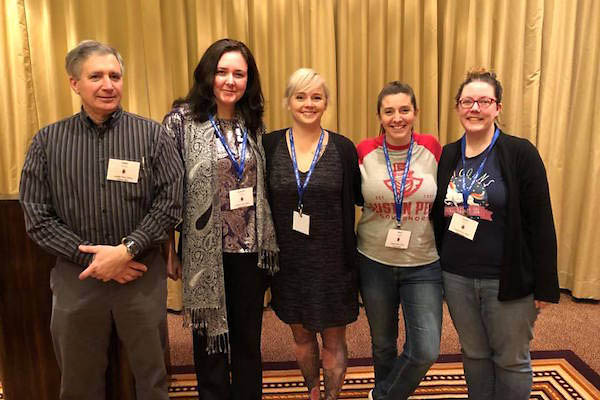 Clarksville, TN – Anyone passing through the Intercontinental Hotel in New Orleans last month might have paused at all the strange questions drifting out of the hotel’s meeting rooms.
Clarksville, TN – Anyone passing through the Intercontinental Hotel in New Orleans last month might have paused at all the strange questions drifting out of the hotel’s meeting rooms.
“Are werewolves from Europe or Ancient Arabia?” “How did American soldiers fare during World War I?” “Why did Nashville legalize prostitution in the late 19th century?”

A little investigating would have revealed that the hotel was hosting the Biennial Phi Alpha Theta National History Conference, and some of the more interesting presentations were being delivered by Austin Peay State University students.
“We had five Phi Alpha That members present at this national conference, and they had a great time,” Dr. Minoa Uffelman, APSU professor of history and PAT advisor, said. “Each of them had a positive experience presenting their research, while also meeting students from all over the country and having professors give them feedback during their commentaries.”
The students, and their presentations, were:
- Jenny Brown, “The Legalization of Late 19th Century Prostitution in Nashville and Its Effect on African American Women;”
- Beth Bisciglia, “Faeries, Jinn, Werewolves and Witches: The Fantastical Underworld in Ancient Arabia and Europe;”
- Jennifer Holland, “From Peter the Great to Nicholas II: Russian Military Grand Strategy;”
- John L. Schuler III, “An Objective Evaluation of the American Doughboy in World War I;” and
- Mary Vaughn, “Christianity: The Greatest Chameleon in Anglo-Saxon England.”
These five, high-achieving APSU students were able to spend several days mingling with renowned scholars and presenting their research, thanks to funding by the APSU Office of Student Research and Innovation.
“Providing this type of funding only reinforces our institutional commitment to the success of our students,” Dr. Erin Lynch-Alexander, director of Student Research and Innovation, said. “This office understands this commitment and is dedicated to supporting the intellectual capacity of students because, ultimately, their scholarly contributions are the stitch-work to the academic tapestry of APSU.”
The five students are all members of APSU’s Phi Alpha Theta (PAT) History Honor Society, which has won nine national “Chapter of the Year” awards. PAT is a professional society with the goal of creating a network of scholars that encourages research.
“Networking with other historians and students is an important part of these conferences, and the professors who attended were willing to sit and talk with students about their research and about their career and academic paths in the future,” Jenny Brown, APSU student and PAT president, said.
For information on the convention or the local PAT chapter, contact Uffelman at uffelmanm@apsu.edu or 931.221.7704.



